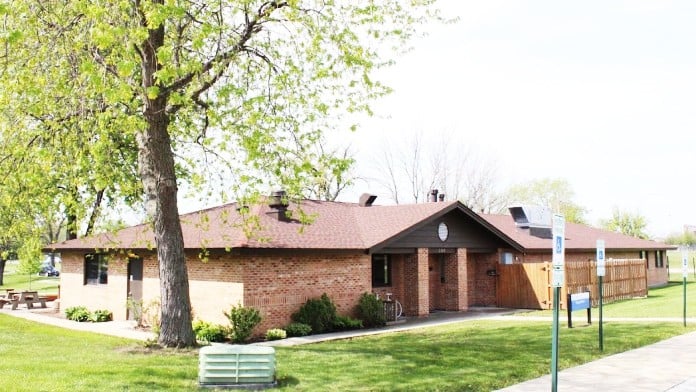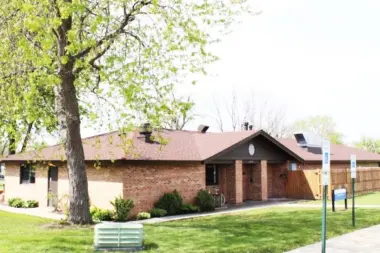About Lake County Behavioral Health – Mental Health Group Home
The Lake County Behavioral Health Mental Health Group Home is a treatment facility that helps support adults who have chronic mental health struggles that negatively impact their ability to lead healthy and productive lives. This center is located in Waukegan, Illinois, and operates under Lake County Behavioral Health.
Treatment here costs no more than 60% of your monthly income, and there is a cap, meaning the cost of care won’t exceed $635.
Supportive Recovery Environment
The Mental Health Group Home can support 14 residents at any given time. This is a community style, structured environment that allows you to receive the individualized care you need. Unlike in a larger medical or hospital setting, you’ll work closely with your care team and apply the skills you’re learning in recovery through everyday activities that you’ll engage in with your peers.
Throughout this program, you’ll focus on building everyday life skills like learning how to manage a budget, housekeeping chores, socialization skill building and how to exist in your community in a way that’s productive for your life. You’ll be supported through vocational services that allow you to build educational and job readiness skills so you can become financially independent.
Access to Substance Abuse Treatment
If there’s an underlying substance abuse issue at play you can get linked to the Lake County Behavioral Health substance abuse recovery program. This program can support you with medication assisted treatment, therapy with licensed addiction counselors and other services that can help address your substance abuse recovery needs.
Wraparound Support
Overall, the Lake County Behavioral Health Department can provide access to a range of resources that will improve your chances of leading and maintaining a sober and healthy future. No matter where you’re at with your behavioral health struggles, you’ll be provided treatment and linkage to social supports like housing, funding, healthcare and other resources in your local community.
Rehab Score
Gallery


Accepted Insurance
Other Forms of Payment
Medicaid is a state based program that helps lower-income individuals and families pay for healthcare. Medicaid covers addiction treatment so those enrolled can use their coverage to pay for rehab. When a program accepts Medicaid the client often pays very little or nothing out of their own pocket.
Private insurance refers to any kind of healthcare coverage that isn't from the state or federal government. This includes individual and family plans offered by an employer or purchased from the Insurance Marketplace. Every plan will have different requirements and out of pocket costs so be sure to get the full details before you start treatment.
Self-pay involves paying for treatment out of your own pocket. You can use savings or credit, get a personal loan, or receive help from family and friends to fund your treatment. If you don't have insurance or your insurance plan doesn't cover a specific program, self-pay can help ensure you still get the care you need.
Financial aid can take many forms. Centers may have grants or scholarships available to clients who meet eligibility requirements. Programs that receive SAMHSA grants may have financial aid available for those who need treatment as well. Grants and scholarships can help you pai for treatment without having to repay.
Sliding scale payments are based on a client's income and family size. The goal is to make treatment affordable to everyone. By taking these factors into account, addiction recovery care providers help ensure that your treatment does not become a financial burden to you or your family, eliminating one barrier to care.
Medicare is a federal program that provides health insurance for those 65 and older. It also serves people under 65 with chronic and disabling health challenges. To use Medicare for addiction treatment you need to find a program that accepts Medicare and is in network with your plan. Out of pocket costs and preauthorization requirements vary, so always check with your provider.
Addiction Treatments
Levels of Care
The purpose of this program is to prevent and treat chronic/severe emotional and psychiatric disorders. Services in this program include diagnostic evaluation, psychiatric assessment, and crisis intervention to adults who have a history of chronic mental illness. Clients who receive their psychiatric medication services may also qualify for individual and/or group psychotherapy, depending on the type of funding the client has.
12-step programs are addiction recovery models based on Alcoholics Anonymous (AA). A number of substance abuse programs (including some drug and alcohol rehab centers) use the 12 steps as a basis for treatment. Beginning steps involve admitting powerlessness over the addiction and creating a spiritual basis for recovery. Middle steps including making direct amends to those who've been hurt by the addiction, and the final step is to assist others in addiction recovery in the same way. 12-Step offshoots including Narcotics Anonymous (NA), Cocaine Anonymous (CA), Dual Recovery Anonymous (DRA), Sex and Love Addicts Anonymous (SLAA) and Gamblers Anonymous (GA).
Completing a drug or alcohol rehab program shouldn't spell the end of substance abuse treatment. Aftercare involves making a sustainable plan for recovery, including ongoing support. This can include sober living arrangements like halfway houses, career counseling, and setting a patient up with community programs like Alcoholics Anonymous (AA) or Narcotics Anonymous (NA).
The shared apartment program is supported, transitional housing designed to assist individuals to achieve necessary skills to live independently in the community. CILA (Community Integrated Living Arrangements) is a supervised, supportive service to those individuals with severe emotional difficulties who have had at least 3 hospitalizations in a state-operated facility. The goal of CILA is to promote residential and emotional stability through carefully tailored service planning with client, family, significant others and staff of Behavioral Health.
Residential treatment programs are those that offer housing and meals in addition to substance abuse treatment. Rehab facilities that offer residential treatment allow patients to focus solely on recovery, in an environment totally separate from their lives. Some rehab centers specialize in short-term residential treatment (a few days to a week or two), while others solely provide treatment on a long-term basis (several weeks to months). Some offer both, and tailor treatment to the patient's individual requirements.
Treatments
The central task of the Dual Diagnosis Group is to help clients learn more about the interaction between addiction and mental illness, and to help them increase stability in adult functioning through the establishment of sustained sobriety and continued recovery from mental illness. You must be receiving services from at least one of our Behavioral Service programs to be in this group.
Mental health rehabs focus on helping individuals recover from mental illnesses like bipolar disorder, clinical depression, anxiety disorders, schizophrenia, and more. Mental health professionals at these facilities are trained to understand and treat mental health issues, both in individual and group settings.
Programs
Adult rehab programs include therapies tailored to each client's specific needs, goals, and recovery progress. They are tailored to the specific challenges adult clients may face, including family and work pressures and commitments. From inpatient and residential treatment to various levels of outpatient services, there are many options available. Some facilities also help adults work through co-occurring conditions, like anxiety, that can accompany addiction.
Young adulthood can be an exciting, yet difficult, time of transition. Individuals in their late teens to mid-20s face unique stressors related to school, jobs, families, and social circles, which can lead to a rise in substance use. Rehab centers with dedicated young adult programs will include activities and amenities that cater to this age group, with an emphasis on specialized counseling, peer socialization, and ongoing aftercare.
Clinical Services
Cognitive Behavioral Therapy (CBT) is a therapy modality that focuses on the relationship between one's thoughts, feelings, and behaviors. It is used to establish and allow for healthy responses to thoughts and feelings (instead of unhealthy responses, like using drugs or alcohol). CBT has been proven effective for recovering addicts of all kinds, and is used to strengthen a patient's own self-awareness and ability to self-regulate. CBT allows individuals to monitor their own emotional state, become more adept at communicating with others, and manage stress without needing to engage in substance abuse.
In the DBT Group patients must be involved in individual therapy at the clinic to be in this group. The group uses instructional lecture, group discussion, behavioral rehearsal with modeling and role-play, written handouts, and homework assignments to help you decrease unmanageable issues in your life. Mindfulness skills are central to this group.
Family involvement with treatment, when clinically helpful to a client's progress, is encouraged. Case managers are available to assist families in obtaining the resources necessary to restore balance. They strive to help youth and their families develop positive coping techniques, communication skills and the means to manage mental health issues, while maintaining a healthy lifestyle.
Group therapy is any therapeutic work that happens in a group (not one-on-one). There are a number of different group therapy modalities, including support groups, experiential therapy, psycho-education, and more. Group therapy involves treatment as well as processing interaction between group members.
In individual therapy, a patient meets one-on-one with a trained psychologist or counselor. Therapy is a pivotal part of effective substance abuse treatment, as it often covers root causes of addiction, including challenges faced by the patient in their social, family, and work/school life.
Life skills trainings involve all the skills a person must have in order to function successfully in the world. Truly successful addiction recovery is based on the ability to not only live substance-free, but to thrive. Life skills teaches the practical necessities of functioning in society, which sets clients up for success in life, and therefore sobriety. Services include assisting with budget management, cooking, housekeeping, socialization, laundry, personal care and recreation.
The Trauma Treatment Program provides services to Lake County residents, ages 2 through 18, who have experienced trauma. Trauma Focused—Cognitive Behavioral Therapy is an evidenced-based treatment proven effective in working with children and adolescents who have experienced trauma. TF-CBT teaches us how to cope with unhelpful or inaccurate thoughts, confusing and overwhelming feelings, and unhealthy or risky behaviors that the experience of trauma many times causes. Topics include: Education about Trauma, Relaxation, How to Identify and Express Emotions.
Amenities
-
Private Setting
Staff & Accreditations
Staff
Sam Johnson
Interim Executive Director
Kimberly Burke
Director of Healthcare Operations
Angela Cooper
Director of Finance and Administrative Services & CFO
Michele Esser
Interim Director of Behavioral Health
Lisa Kritz
Director of Prevention
Lawrence Mackey
Director of Environmental Health
Jerry Nordstrom
Director of Business Operations
John Wurl
Director of Health Informatics and Technology
Accreditations

The Joint Commission, formerly known as JCAHO, is a nonprofit organization that accredits rehab organizations and programs. Founded in 1951, the Joint Commision's mission is to improve the quality of patient care and demonstrating the quality of patient care.
Joint Commission Accreditation: Yes
Contact Information
2410 Belvidere Road
Waukegan, IL 60085
